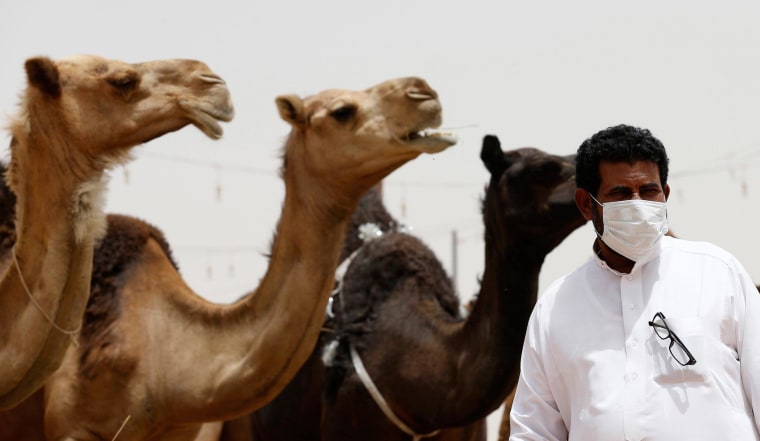The outbreaks of mysterious MERS virus isn’t yet a global emergency, but the coming mass pilgrimage to Saudi Arabia called the Hajj will give the virus a big chance to spread, the World Health Organization said Tuesday.
Health officials said Saudi Arabia is taking important steps to study and control the virus, which travelers have carried around the world, including to the United States.
Camels and hospitals are both important for the spread of the virus, which has infected more than 700 people and killed at least 249 of them, making for a worrying 36 percent fatality rate, WHO said. Those are just officially reported cases — other groups, including the European Center for Disease Control, gives a higher count of more than 800 cases.
But basic awareness and simple hygiene measures should be enough to control its spread, WHO’s MERS Emergency Committee said after its meeting.
“The Committee indicated that the situation remains serious in terms of public health impact. However, the upsurge in cases that began in April has now decreased and there is no evidence of sustained human-to-human transmission in communities,” WHO said in a statement.
"The situation remains serious in terms of public health impact."
Saudi Arabia has stepped up its efforts to control the virus, to find out how it’s spreading and to communicate with WHO, the organization’s Dr. Keiji Fukuda said. “I am confident the government of Saudi Arabia has significantly strengthened its effort to stay on top of the numbers,” Fukuda told a news conference. “I see a big amount of improvement taking place.”
Saudi officials said earlier this month they had found 113 previously unreported cases of MERS infection in old medical records — and more than 90 extra deaths. At almost the same time officials also announced they had fired Dr. Ziad Memish, who had been heading the kingdom’s MERS efforts.
The Middle East respiratory syndrome (MERS) virus emerged in Saudi Arabia in 2012. It’s a coronavirus, in the same family as the severe acute respiratory syndrome (SARS) virus that caused an epidemic in 2003 and infected around 8,000 people and killed more than 700 of them before it was stopped. The worry is that it will acquire the ability to pass easily from person to person, something that could spark a pandemic.
U.S. health officials confirmed Tuesday that two health care workers who carried the virus to the United States did not infect anybody else.
Today, the risk of MERS infection in the United States remains low, but it is important that we remain vigilant and quickly identify and respond to any additional importations," said Dr. David Swerdlow, who leads MERS efforts at the Centers for Disease Control and Prevention.
A big worry is the annual Hajj — the mass pilgrimage to the city of Mecca that devout Muslims try to undertake at least once in their lives. The U.S. Centers for Disease Control and Prevention estimates that 11,000 Americans are among the millions of followers who make the trip every year. It will start the first week of October.
There's also a less focused pilgrimage called Umrah.
"The time to strengthen (prevention measures) is now because we are on the eve of the Umrah starting and in a few months the Hajj will be starting," Fukuda said.
“Is it because camels sneeze?”
WHO says much more study needs to be done to find out just how the virus is spreading — for instance, how it gets from camels to people and whether it’s spread on surfaces. “Is it because camels sneeze?” Fukuda asked.
WHO says vulnerable countries, especially in Africa, need better public health systems to protect people. And it has some advice about which measures are worthwhile, including "fever detectors" at airports.
“Finally, the Committee indicated that there was no solid information to support the use of thermal screening as a means to stop or slow the entry of MERS infections, and that resources for supporting such screening could be better used to strengthen surveillance, infection control and prevention or other effective public health measures,” it said.
